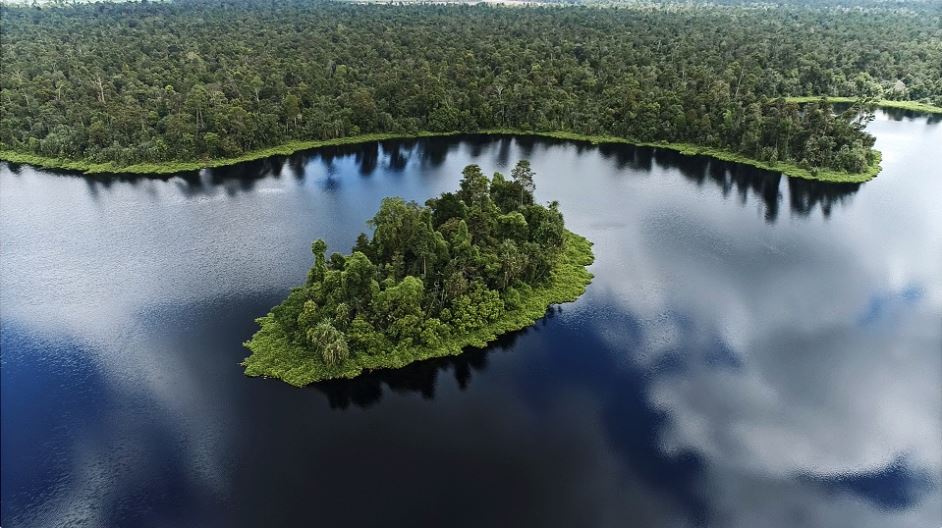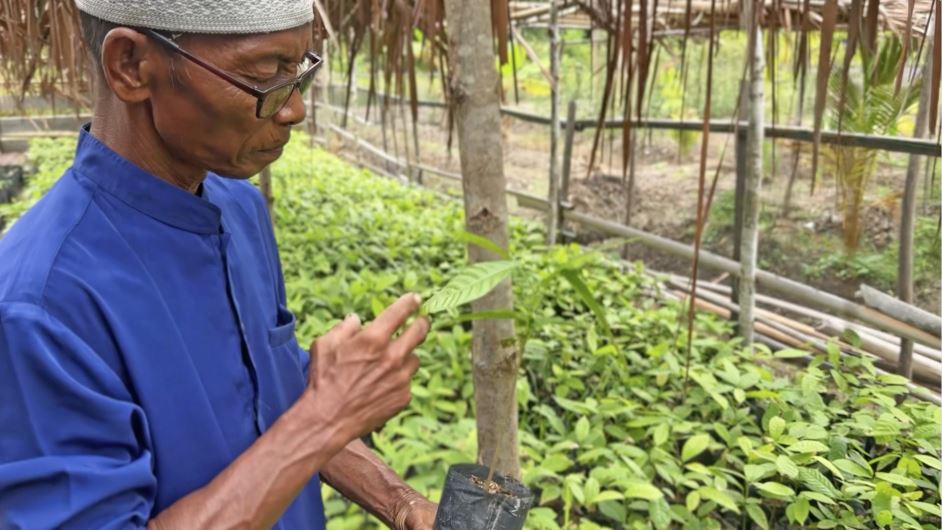October 23, 2024
Peat forest restoration by Restorasi Ekosistem Riau (RER) on the Kampar Peninsula and Padang Island is a complex and continuous effort. Within the borders of the RER concessions, a combination of forest protection, canal blocking, forest reforestation, and biodiversity monitoring are steadily progressing to conserve biodiversity and restore ecosystem balance. Through its production-protection landscape approach, RER is actively restoring the peat forests of the Kampar Peninsula and Padang Island. This model strategically integrates fiber plantations with natural forest restoration zones, ensuring that forests are safeguarded from external threats while the plantations produce fiber to generate revenue that is invested into conservation efforts. However, outside the boundaries of RER, certain forest areas remain at risk from illegal logging, driven by communities dependent on wood supply for income.
To address this issue, RER is working with two community’s to support forest protection and restoration, and enhance alternative community livelihoods that will reduce the threat of illegal logging to RER and adjacent forests.
Collaborating with Communities Surrounding RER
Local Village Forest Management Institutions (Lembaga Pengelolaan Hutan Desa, or LPHD) have statutory responsibility to protect and manage their forest area, but often lack the capacity to comply with government regulations and overcome illegal logging threats on their own. In response, PT Gemilang Cipta Nusantara (GCN), one of four-ecosystem restoration company’s in the RER program, has established a social forestry partnership to provide LPHD with the technical and financial support necessary to protect their forests.
The scope of this program includes seven major areas of impact: Strengthening village forest management institutions, developing a work plan, forest protection, research and development, human resource capacity building, village forest business development and community empowerment.
How Segamai Village is Safeguarding Their Forest
The 2,270 ha Segamai village forest borders the eastern edge of the PT GCN concession serving as an important buffer for the RER forest against external threats.

The collaboration between PT GCN and LPHD Segamai began in December 2022, with the following targets:
The process of developing a collaborative agreement between PT GCN and LPHD Segamai began with socialization and discussions between all members, conducted at the home of the LPHD chief in Segamai Village. This resulted in an understanding between PT GCN and LPHD on the importance of collaboration with regards to managing the Segamai village forest.
Progress made in 2023
In April 2023, a Cooperation Agreement was prepared and agreed in principle by both parties – PT GCN and LPHD Segamai. However, there is a long process to legally finalize the Agreement and the threat of illegal logging activities continued to occur in the Segamai Village Forest; therefore, these parties agreed to be pro-active in the interim.
First, a request for assistance was sent to the Environmental and Forestry Law Enforcement – Ministry of Environment and Forestry (GAKKUM – KLHK) in April 2023. In May, a GAKKUM intelligence team conducted a field visit and documented evidence of illegal logging in Segamai village forest that included tree stumps, processed wood, temporary huts filled with equipment and the perpetrators themselves.
To stop the illegal logging and prevent future occurrence the LPHD Segamai constructed a guard post in the village forest where both LPHD members and GCN can be based for extended periods to carry out a regular schedule of forest patrols, biodiversity monitoring and forest restoration. Since completion of the guard post and regular staffing was finalized in September 2023, there has been no re-occurrence of illegal logging in Segamai village forest. LPHD members have been actively patrolling, monitoring and working in the forest deploying 9 camera traps, establishing a tree seedling nursery, measuring peat depth and above-ground biomass.
Improving Sustainable Farming Practices in Serapung Village
In the absence of regular employment and income, some individuals may turn to illegal forest exploitation such as wood extraction, land claims and conversion to agriculture and wildlife poaching. In order to reduce pressure on the forest and its associated biodiversity, it is essential to develop and enhance alternative livelihood opportunities that will generate income and improve living standards. Working in partnership with Tropenbos Indonesia (TBI), RER is supporting the island/village of Serapung to re-vitalize rice cultivation systems and build capacity in community farming groups.

This approach has improved seasonal plant cultivation systems for local food and horticulture businesses by providing organic alternatives to chemical fertilizers; developing new planting processes; opening new land for cultivation, and thereby increasing farmers’ yields; implementing new intercropping systems for horticulture crops; and hosting regular training and development activities through a dedicated Field School.
As a result of these activities, a total of 105 farmers were assisted, including 67 farmers from three farmer groups and 38 farmers from two Women’s Agricultural Groups. This included rice-growing trials conducted on previously barren land, as well as training in the creation and application of organic fertilizers and vegetable-based pesticides. Now, the farmer groups are able to produce their own fertilizers and pesticides using local materials like pineapple, coconut water, bananas, brown sugar, ginger, turmeric, and other ingredients. In addition, the farmer groups began developing a nursery for cacao seedlings with plans to plant 15 ha in 2025.
Community collaboration is essential to gain trust and understanding with organizations such as the Segamai LPHD and the farmers of Serapung Village and supported by partnerships with experienced social forestry NGOs such as Tropenbos Indonesia. Only by working together, can forest managers and communities successfully prevent illegal logging and restore peat forests.